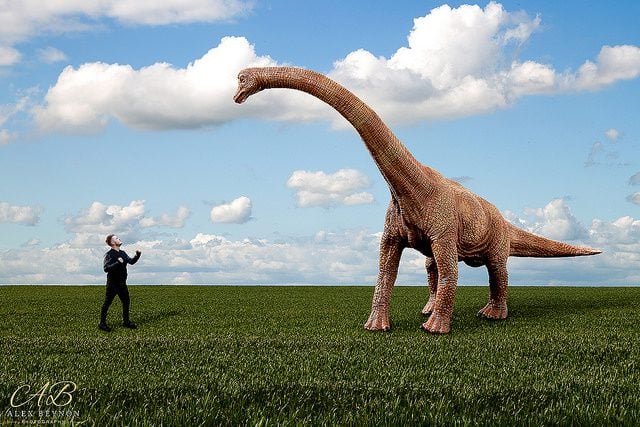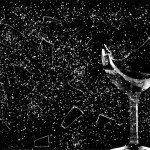
Photograph by Alex Beynon (5-16-14) [Flickr / CC BY-ND 2.0 license]
***
(9-18-10)
*****
TAO (The Anonymous One; aka Turretinfan)
A plain reading of the Old Testament and the Gospels makes it clear that the world was created supernaturally by God in the space of a week, and more particularly, in six days each consisting of an evening and morning. This event took place less than 10,000 years ago, which we can calculate more or less accurately from geneologies provided, for example, in Genesis 5 and the gospels.
Frankly speaking, there is no reason for anyone who excludes outside information from the Bible to arrive at any other conclusion. The Bible, on its face, is clear. God created the world, he did so in six days, and rested on the seventh day. In celebration of this fact, we observe the week.
Nevertheless, from time to time, weak Christians are tempted to believe the testimony of scientists (and their acolytes) who claim that they have unshakable evidence (some may even claim “proof”) that the earth is older than 10,000 years. These Christians, led astray by the lies, deceit, or simply errors of the “science crowd” believe the testimony of the crowd.
Some do so by disbelieving the testimony of Scripture outright: these are the so-called Theistic Evolutionists. They deny that God created man from the dust of the Earth and woman from the rib of man. Others, however, seek to harmonize the Bible somehow to the old earth claims of the science crowd. These are termed Old Earth Creationists. They create novel and sometimes bizarre interpretations of Scripture to try to justify a timeline that holds the universe to be tens of billions of years old, and biological life to be billions of years old. . . .
Today, the idea that man was created less than 10,000 years ago is out of vogue with the science crowd, . . . the science crowd will not agree that all of humanity descended from a single pair of human ancestors who lived less than 10,000 years ago. Instead, we see modified old earth creationists holding to ever more erratic views of the text of Scripture, as they attempt to remain popular with the scientific crowd. (7-3-07)
There is no need for further evidence for Young Earth Creationism (YEC), since Scripture speaks clearly via the Creation account (one week) and the Old Testament genealogies. (11-7-07)
Steve Hays
*
I don’t link to an OEC like Hugh Ross because I don’t find much of either scientific value or exegetical value in his writings. . . .
The universe is between 6000-10,000 years old, give or take. . . . I agree, but with certain qualifications . . . (10-22-06)
YEC takes Scripture as its frame of reference . . . (3-9-09)
“Saint and Sinner”
*
Due to my philosophy of science, Instrumentalism, I allow Scripture to speak for itself, and so, I am a YEC. (3-11-07)
R. C. Sproul
*
I now hold to a literal six-day creation, . . . Genesis says that God created the universe and everything in it in six twenty-fourhour periods. According to the Reformation hermeneutic, the first option is to follow the plain sense of the text. One must do a great deal of hermeneutical gymnastics to escape the plain meaning of Genesis 12. The confession makes it a point of faith that God created the world in the space of six days.
(Truths We Confess: A Laymans guide to the Westminster Confession of Faith, Volume I: The Triune God (Chapters 18 of the Confession)[Phillipsburg, New Jersey: P&R Publishing, 2006, pp. 127128, cited at a YEC website)
We have a problem not only with a six-day creation, but also with the age of the earth. Is the earth a few thousand years old or billions of years old (as scientists today insist)? . . . If we take the genealogies that go back to Adam, however, and if we make allowances for certain gaps in them (which could certainly be there), it remains a big stretch from 4004 BC to 4.6 billion years ago. (Ibid., pp. 121122)
Bishop “Dr.” [???] James White
*
Thaxton’s book, The Soul of Science (Bible Science Association, 1994), co-written with Nancy R. Pearcey (a young-earther) and Marvin Olasky (yet another young-earther), is listed in YEC icon and central figure Henry Morris‘ lengthy Young-Earth Creationist Bibliography. Morris states: “The books listed in this bibliography represent works of authors advocating literal creationism, including the six-solar-day creation week and a worldwide cataclysmic flood.” That pretty much proves that Thaxton is in the YEC camp.
Bradley and Olsen, however, are old-earthers. There is a chance White is the same, but in favorably citing YEC Kenyon’s foreword to a book at least partially written by YEC Charles B. Thaxton, the likelihood is that White, too, is a young earth creationist, since those who deny the YEC position generally don’t cite YEC’s as reputable scientific authorities (I certainly would never do so).
Moreover, White hosts on his website, the article, “The Flood, Dinosaurs, Oh My!,” by his colleague Jeff Downs, who states, “I’ll admit that I’m a YEC.” It’s difficult to imagine that White would host such a piece, while fundamentally disagreeing with it, but he might. The more plausible interpretation, in my opinion, is that he agrees with it.
John MacArthur
According to Scripture, God created the universe over six days time and rested on the seventh day. . . . To reject a literal, six-day interpretation is to confound that memorial. Furthermore, it is a denial of the completeness of Gods creation. (6-20-10)
Uniformitarian geologists start with the assumption that the earth is millions and millions of years old. When they go to the evidence, they find what they’re looking for old fossils, old rocks, and the marks of long ages of time. But what if you start with a different set of assumptions? What if you go to the evidence assuming the biblical record is true, namely, that the earth is relatively young and there was a cataclysmic event known as the Flood. (7-2-10)
Phil Johnson (Pyromaniacs)
*
“Rhology”
*
It has to do w/ the age of the earth. As I’m sure you know, it is oft claimed that an old earth is the more “scientific” position, and that one would have to hold to a young earth position (say, less than 10,000 yrs old) solely on faith. What I’ve been discovering in my journeys of thought, debate, and polemics over the last 3-4 yrs, however, is that any opponent of my position who accuses me of blind faith has at least an equal investment of blind, unprovable faith in their own position, but they don’t realise it (for the most part) or hide it (I suspect that is the case for at least a few). (2-19-07)
[Catholic Peter Sean Bradley] you seem to think that defending a literal six days of creation is completely different.
Since Scr[ipture] teaches the 6 days of creation and doesn’t teach geocentrism, I don’t see any reason to make an apology on that. (11-9-07: on the notorious know-nothing Boors All blog)
The Bible doesn’t really support an old earth . . . (5-2-08)
. . . Young Earth Creationism, especially the kind that I generally argue, where my answer to why geological structures appear to be really old is b/c God created them, like Adam, with a certain appearance of age to the natural eye. (9-25-09)
*****
Discussions in the combox (see the complete huge discussion):
I would describe the YEC position along the lines of (to put it diplomatically) being “scientifically challenged.”
The Church never teaches that the earth is a certain age; therefore, to embrace it “dogmatically” is a rejection of Church authority.
By the same token, a Catholic is free to believe it, since it isn’t dogma. But he can’t say that the Church teaches YEC as a matter of dogma, because that is simply untrue. There is no such dogma. The Church takes no dogmatic stand yay or nay on evolution, either. It requires every Catholic to believe in a primal pair of human beings (Adam and Eve) and original sin; also in the supernatural creation of every human soul (Pope Pius XII, Humani Generis, 1950). That is consistent with either a creationist or theistic evolutionary view.
So its not a dogmatic issue, but YEC is a scientific issue, and can be rejected on that basis. From the perspective of science, I say it is pure bunk and refuted many times over in many ways, by the usual means of scientific, empirical observation. An old earth is exceedingly supported by scientific findings.
I haven’t called anyone a nut or a wacko, etc. (I specifically rejected such categorization). Others in the thread have done that, but not I. The original intent of the post was simply to document a strong sociological association of YEC with active, zealous anti-Catholicism. Since then I have clarified some things, and noted what I think is some profound ignorance of scientific method and findings, but haven’t attacked anyone’s person. Ignorance of so-and-so is a belief someone holds, not the person himself or herself.
The common ground is lack of education. The YEC is uninformed about science (esp. geology) and the anti-Catholic is uninformed about historic theology (esp. ecclesiology). So it stands to reason that a person given to lack of learning and understanding in one area will have that approach spill over into others. And that is indeed what we see.
Also, both views almost always stem from fundamentalism and all that that entails. I described the “mindset” of that as:
. . . an inability to understand definitions of words, multiple definitions, non-literal interpretation, idiom, context, cultural background of how words are used in the Bible, ancient Hebrew (biblical) thinking, and so forth. I see that as essentially the root of the whole error.
With this sort of attitude, going into science, with all its complexities and nuances, one can see that there is little prospect of one with fundamentalist presuppositions arriving at scientific truths and the consensus of the scientific community on a thing like the age of the earth: because they bring an already profoundly mistaken view of biblical hermeneutics to the table, and they think one can only conclude from the Bible that the earth is 6000-10,000 years old (as Steve Hays holds).
But I haven’t stated that YECs are “nuts.” I don’t think that about YECs. I think they are simply guilty of hopelessly confused and mistaken conclusions about certain scientific matters (and also ecclesiological ones, in the case of the anti-Catholics).













